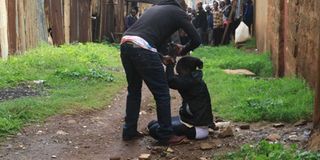Nairobi, Kisumu GBV hotspots, report reveals

What you need to know:
- Report by Healthcare Assistance shows shows Nairobi, Kisumu, Kiambu, Homa Bay, Siaya, Nakuru, and Mombasa counties lead in GBV.
- No cases reported in Tharaka-Nithi,Taita-Taveta, Mandera, Isiolo, Elgeyo-Marakwet, Marsabit and Wajir in April.
- HAK partnered with Global Affairs Canada’s Field Support Projectand are helping victims through a rapid call centre and the national GBV toll free helpline 1195, manned 24 hours by 12 Tele-counsellors.
Cases of Gender Based Violence (GBV) have been reported in 38 out of 47 countries since the Covid-19 pandemic was confirmed in the country in mid-March.
A new report by Healthcare Assistance (HAK) on Covid-19 and GBV shows Nairobi, Kisumu, Kiambu, Homa Bay, Siaya, Nakuru, and Mombasa counties lead in gender related violence cases in the country.
In April, Nairobi recorded a total of 94 GBV cases followed by Kisumu with 58, Kiambu 34, Homa Bay 25, Siaya 23, Nakuru 21 and Mombasa 19.
No GBV cases were, however, reported in Tharaka-Nithi,Taita-Taveta, Mandera, Isiolo, Elgeyo-Marakwet, Marsabit and Wajir in the same month.
To mitigate GBV amidst Covid-19 crisis, HAK partnered with Global Affairs Canada’s Field Support Project (FSSP) to respond to the vice during the pandemic. This is being done virtually through HAK’s Rapid Call Centre and the national GBV toll free helpline 1195, manned 24 hours by 12 Tele-counsellors.
The report says women and girls continue to suffer the consequences of GBV during the pandemic with victims experiencing physical injuries and mental health.
They have also experienced sexual and reproductive health-related problems including sexually transmitted infections like HIV/Aids and unplanned pregnancies.
"Women remain exposed to GBV both in private and public spaces during the crisis," the report says in part.
GBV SERVICES
In the same month, HAK recorded 1,644 responses, compared to March, where 920 responses were recorded. A total of 461 Covid-19-related GBV cases were recorded in the month of April out of which 281 were women and 73 girls. During the month, 65 men and 42 boys reported GBV cases.
The figures indicate that women remain more exposed to GBV. At least 106 women and nine men accessed GBV services in the month of March.
Another 40 women and girls suffered sexual violence in April compared to 15 the previous month.
In the same month, 1,188 people accessed online Covid-19-related GBV education compared to March at 805.
Cases of psychological torture reported were 206, physical assault 120, child neglect 56, defilement 19 and rape 19. To contain the spread of the virus, the government imposed movement restrictions, lockdown and dusk-to-dawn curfew in March.
This, the report says, led to loss of income, isolation, high levels of stress and anxiety, which made women and girls experience physical, psychological, economic and sexual violence.
BREADWINNERS
“Due to social distancing and curfew, women and girls had less contact with family and friends who would act as the first contact persons during violence. Perpetrators kidnapped women and girls who needed company to get through the dusk-to-dawn curfew if they were caught outside the stipulated time,” the report says in part.
These restrictions, the report observes, led to the rise in domestic violence cases as families are compelled by the orders to stay within their locality, which has caused distress as the breadwinners are not able to provide for their families.
Chief Justice David Maraga on April 2, released a statement that showed the rise in sexual offences since March 13, when Covid-19 was first confirmed in Kenya.
Mr Maraga said sexual offences constituted 35.8 per cent of cases recorded since then which he termed as a worrying trend.
To turn the tide, women’s rights organisations, in April, petitioned the government to set aside at least 30 per cent of the Covid-19 emergency response fund to address gender-based violence in the country.
The rights groups noted that the inability and reduced access to income, loss of jobs and livelihoods, have provided a fertile ground for GBV to thrive.





